AIGA is accessibility and excellence in action
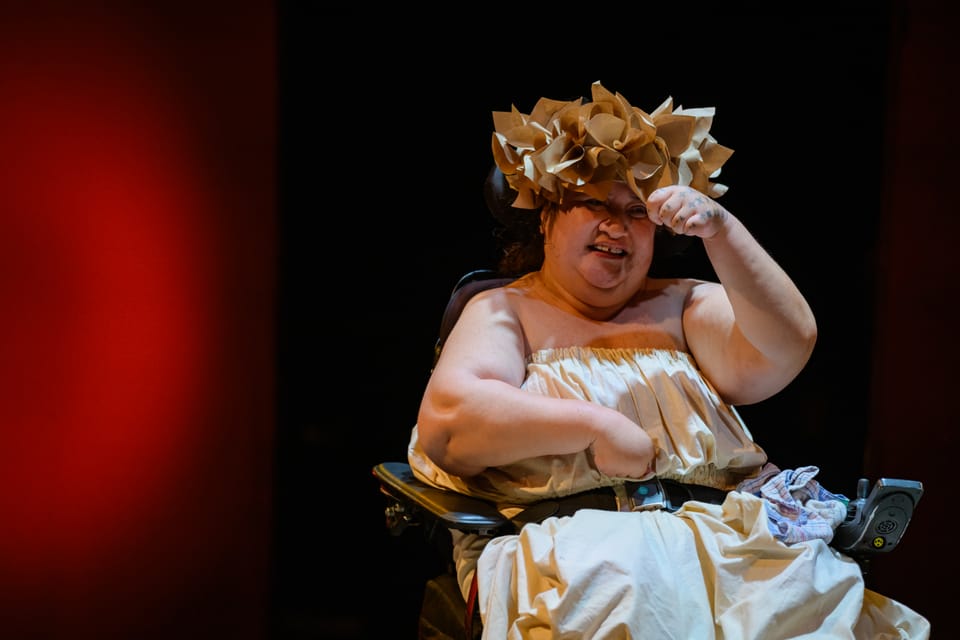
AIGA marks the first public showing of work that Touch Compass have presented under their disability-led kaupapa. I talk to Lusi Faiva, the creator of the work, and Jon Tamihere-Kemeys about the genesis of the work, and what it means to present it at the Auckland Arts Festival.
When you think of the Auckland Arts Festival, certain images come into mind. A bunch of bodies in space, moving amongst each other. Large casts performing internationally acclaimed shows. Maybe a solo show you’ve heard about. An international music act. However, a show premiering tonight at Te Pou Theatre, is putting a stake in the ground on what an arts festival, Auckland’s namesake arts festival, should be.
AIGA, from leading arts company Touch Compass, tells the life story of performer Lusi Faiva using music, movement and dramedy, from 1960s Samoa to the present day. It is a devised show that draws not only on Faiva’s life experiences, but those of her collaborators Iana Grace Pauga, Forest V Kapo, Alex Medland and Fiona Collins. Over the course of an hour, with the aid of audio description, surtitles, NZSL, Lusi doesn’t just tell her story, she tells the story that she wants to tell. Both are equally important.
This work has been in development for three years, making real Lusi’s dream of becoming an actress. This is made possible due to the new Disability-led direction of Touch Compass, thanks to new Kaiwhakahaere Jon Tamihere-Kemeys, and the Artistic Direction panel which includes Faiva herself, internationally acclaimed dancer Rodney Bell and Dr. Suzanne Cowen. For context, three years is a long time for a show to be in development, and this time and space (crip time and crip s p a c e, as defined by the show’s press release) was given to Lusi to again, make sure that the show was made how she wanted it to be made, and would end up being her artistic vision.
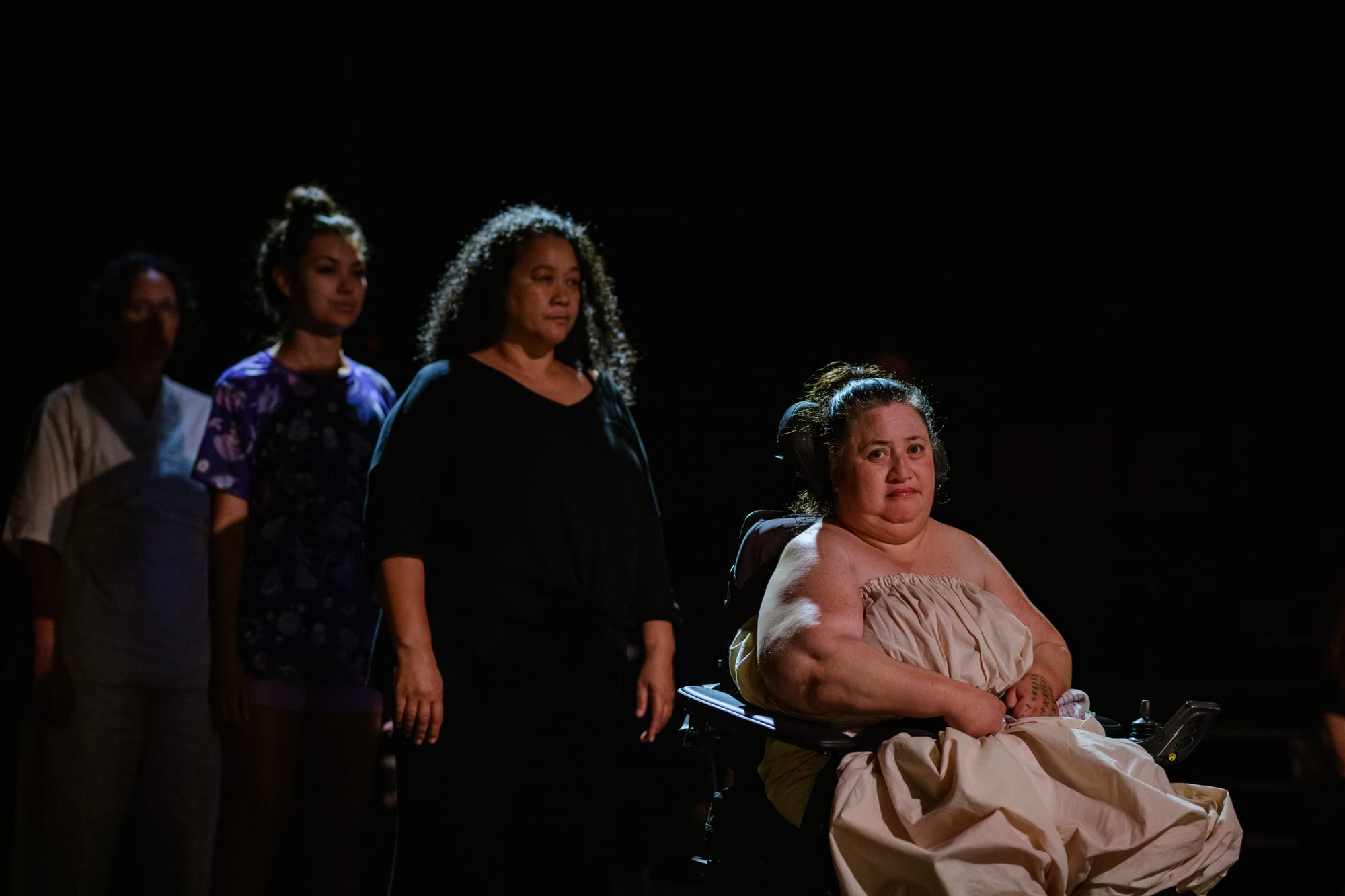
Touch Compass has come a long way since Catherine Chappell MNZM founded it in 1997. What started as a company running integrated dance classes, with a vision of a more enlightened society that accepted and platformed diverse artists is now a core part of the arts ecosystem, giving voice to disabled and non-disabled artists, and championing equity not just through performance, but through education and advocacy.
For Faiva, the journey to making AIGA has brought her “so much peace” in herself, since she created her show, Lusi’s Eden, based on her childhood years living in institutions, back in 2001. She later reprised the show in 2002 and 2007, to rave reviews. Having AIGA platformed in the Auckland Arts Festival, “freaking awesome and scary” for Faiva.
“There was a lot of brainstorming to make the process possible,” she says. “We got on with each other well. It helped us to trust and respect each other’s cultures.”
That trust and respect runs through the DNA of Touch Compass. Despite a significant amount of New Zealanders having lived experience of disability (1 in 4, by some reports), those statistics are not carried through to our performing arts. “You don’t see a quarter of venues holding disability-led arts shows, or a quarter of performing arts casts and dance companies featuring d/Deaf, blind low vision, disabled actors, dancers, performers and producers,” says Tamihere-Kemeys.
He sees the mission of Touch Compass to be a challenge to the ecosystem to be equitable in all aspects. “We are one of the avenues through which lived experience perspectives can be championed, honoured and witnessed.”
Tamihere-Kemeys sees Faiva, as well as her fellow Artistic Direction Panel members, as enablers for people with lived experience of disability to see themselves represented on local and international stages. “Not as other, not as token add-ons or sideliners but as talented stars in their own right.”
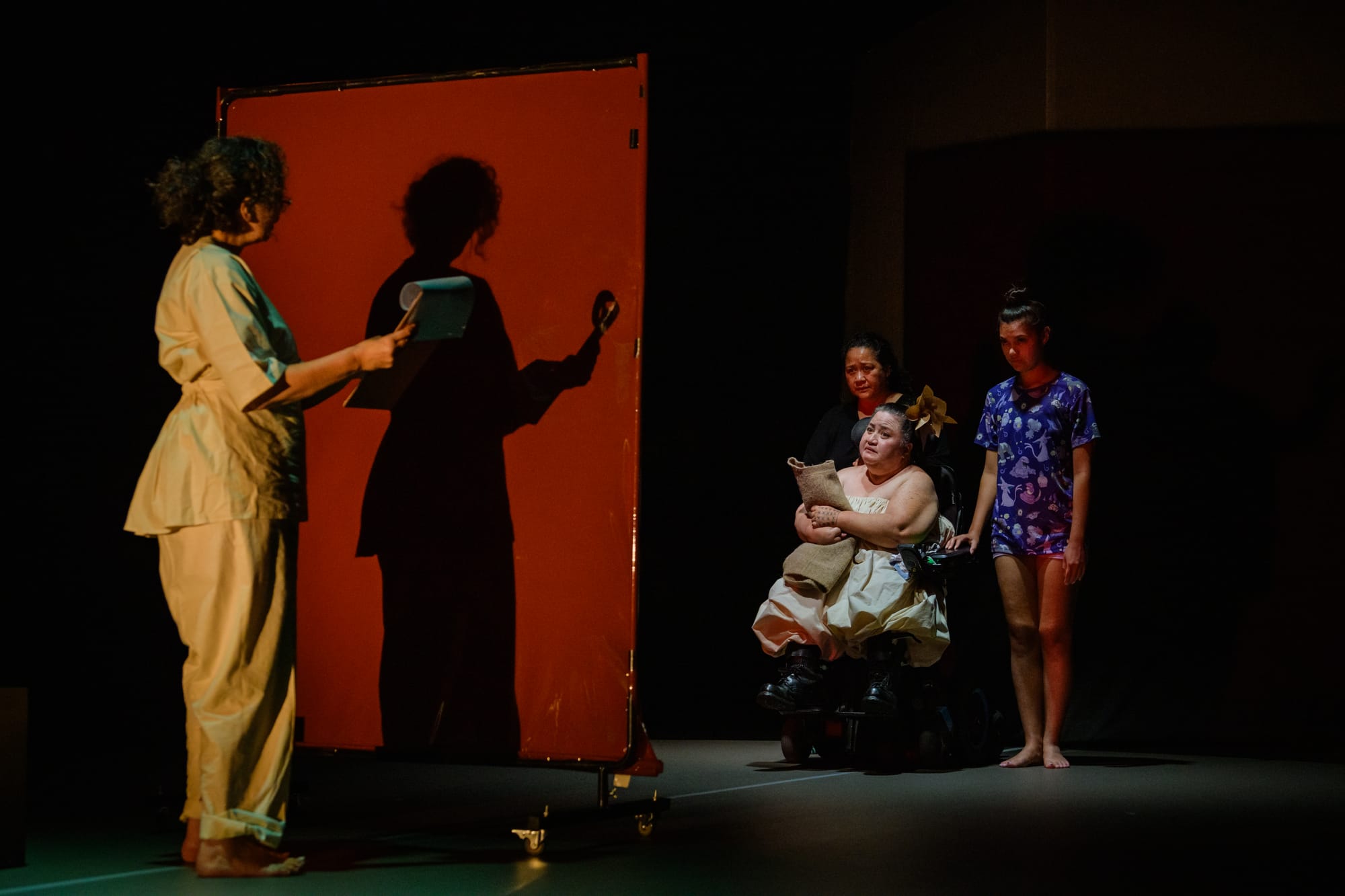
The decisions that Touch Compass make as an organisation are for the benefit of the next generation. “Lusi is all about opening paths for the next generation of Deaf, blind low vision, disabled and neurodivergent arts makers,” he says. “That’s a powerful resource any leader in any setting can only be honoured to have on board.”
He acknowledges the many people who have made their way through Touch Compass since its founding in 1997, including those Artistic Direction Panel members. He points to them specifically. “They look to our past to inform our artistic future,” he says. “We’re a mature company as arts makers, with vastly experienced disability leaders on board, but in essence we’re ‘toddlers” as we forge a new way forward.”
“It’s an exciting time for us. To be growing and learning.”
AIGA is the first public showing of work that Touch Compass have made under their disability-led kaupapa, and Tamihere-Kemeys believes it is one of the very few – if not the only – disability-led, Pasifika-led works of devised theatre to premiere in the festival. “It’s an honour for us to do that,” he says. “And one for Lusi that’s probably twenty-to-thirty years overdue!”
After seeing an invite-only preview last night, the thing that sits with me most about AIGA, beyond the show, is that it felt like the first fully accessible show I had ever seen. In a week where the government is ruining the lives of disabled people for a sliver of savings, against the needs of that community, it was a sober reminder of what accessibility can be in a performing arts context.
Before the show, tours were given to members of the community based on their needs – touch tours for blind audience members, and I also believe another tour for neurodivergent people. The seating was arranged in a way that made it easier for people who use wheelchairs to be in the space. Both the audio description (by director Moana Ete) and the NZSL interpretation was incorporated into the performance in a way that did not distract, but enhanced the experience.
Every aspect of the show felt designed so that an audience member, from any background (and so often I see “any background” foregrounded in publicity, but that feels so hollow, so meaningless now) could come and enjoy the show on their terms.
The most galling thing, however, was it made me think how many shows could participate in the same level of accessibility. It takes money, sure, but so does putting on a show (and it puts a dent in the budget to limit your audience to only those people who can access it).
It takes thought and time, but again, so does any show. Ultimately, though, it takes the intention. You have to want to make your work accessible for it to be truly, honestly, accessible.
The last words, though, should go to Faiva. It’s been over two decades since the debut of Lusi’s Eden, and long overdue for a festival as massive and influential as the Auckland Arts Festival to be platforming her. All it takes is support, thought and frankly, the intention. “AIGA is opening doors for anyone like me expressing themselves on different platforms, sharing their own journeys.”
“It’s the most beautiful but important thing.”
AIGA is part of the Auckland Arts Festival, and runs at Te Pou Theatre until Sunday March 25. You can buy tickets here.
Writing and reporting takes time, and if you want to support the amount of time it takes (and ensure that the scant amount of meaningful coverage of local art can continue), please considering supporting Dramatic Pause with a paid subscription ($8 p/m, $60 p/a) and if you can't afford a paid subscription, please share the work with your networks!
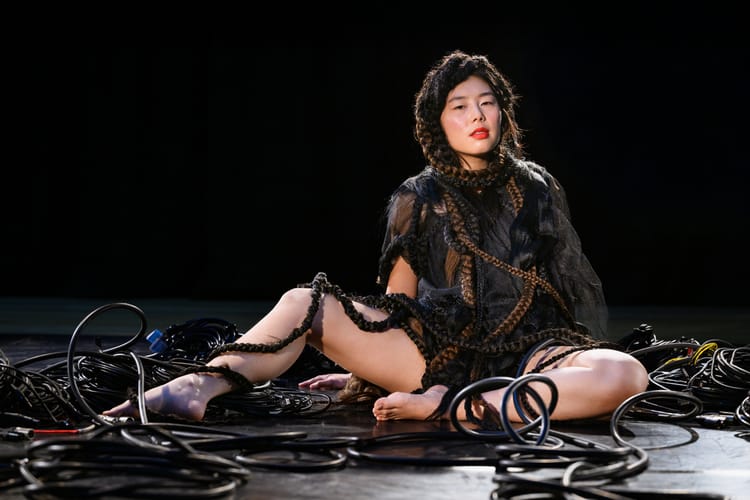
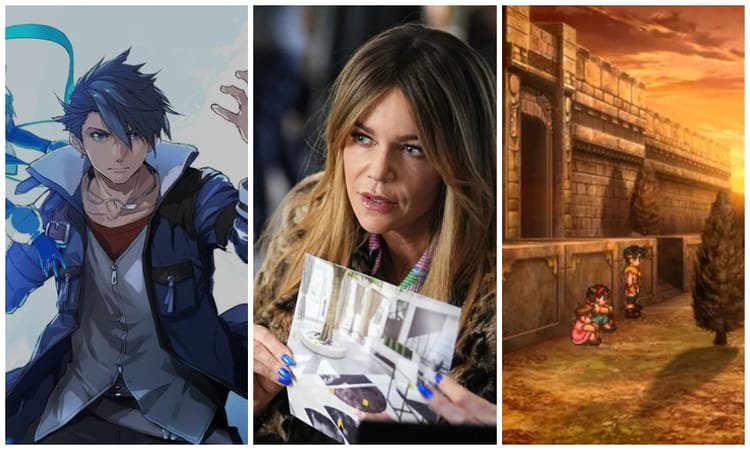
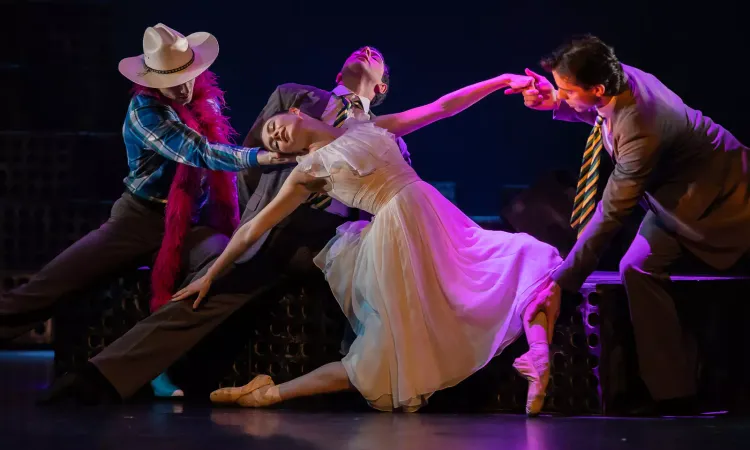
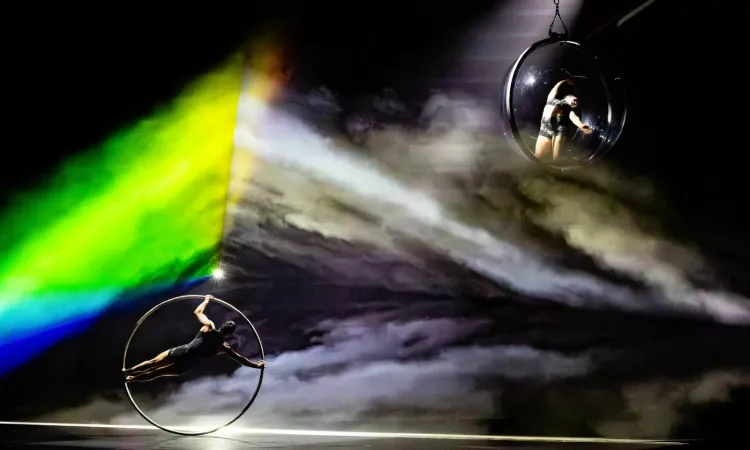
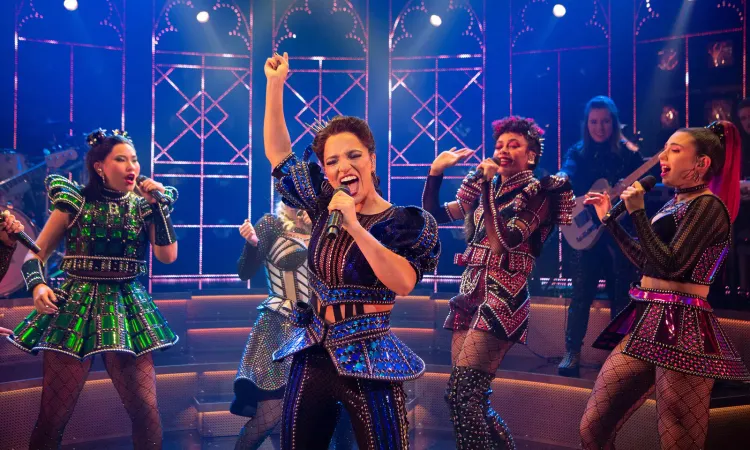
Member discussion